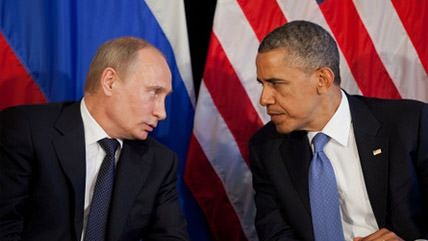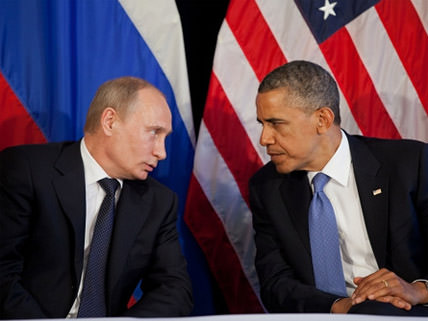How Effective Are U.S. Sanctions on Russia? 'Peanuts,' Says Russia


The U.S. government is weighing another round of sanctions against Russia for its meddling in eastern Ukraine. Piling on sanctions has been America's and the E.U.'s most trusted way of rapping Vladimir Putin's knuckles since he ordered the invasion and annexation of part of Ukraine in March. How effective have these sanctions been, though? It depends who you ask.
"Peanuts," says Russian Trade Minister Denis Manturov. "What sanctions? A holy place is never empty: If one market closes, another opens. What's happening today is peanuts compared to what was then," referencing American sanctions during the Soviet era.
Andrei Belousov, the Kremlin's top economic adviser told Reuters, "The sanctions in their current format don't have a macroeconomic effect. My assessment is that we're in the vicinity of 1 percent (gross domestic product growth) and will stay there until the end of the year."
However, suggests Bloomberg news, "Russia's richest businessmen are increasingly frantic that President Vladimir Putin's policies in Ukraine will lead to crippling sanctions and are too scared of reprisal to say so publicly."
Igor Bunin, head the Center for Political Technology in Moscow, told Bloomberg that "the economic and business elite is just in horror."
And, according to the Bloomberg Billionaire Index, "Amid market turmoil provoked by the Ukraine conflict, the 19 richest Russians lost $14.5 billion since the start of the year, compared to an increase in wealth of $56.5 billion for the richest 64 Americans."
Russia's got problems aside from sanctions. Crimea was pretty poor under Ukraine, getting by on tourism dollars, but since no one is keen on vacationing in a territory occupied by trigger-happy Russian troops, the government is considering hiking domestic taxes to ease the absorption of the peninsula. And, Russian taxpayers are still on the hook for the roughly $50 billion their government spent on the Sochi Olympics.
Sanctions aren't affecting Russia alone, though. They're having a negative impact on business in the E.U., particularly small and mid-sized businesses, according to the German paper Deutsche Welle.
"These [sanctions] affected about a quarter of German companies conducting activities abroad," said deputy head of the Association of German Chambers of Commerce and Industry Volker Treier in an interview this week. He added:
Every third job in Germany depends on exports. If we interrupt German-Russian trade, then we have 300,000 jobs that are affected by this trade.
There are many companies that have made enormous investments in Russia. Do they now have to pay for a political conflict? As a spokesman for industry, I have my doubts, and we have to articulate these doubts.
The latest E.U. sanctions, which are being mulled today, "were designed to spread the burden among the main EU powers, affecting German technology, Britain's financial center and French defense sales," according to another Reuters report. "Trade data show Germany and Italy have the most to lose if the EU steps up sanctions. Austria and the Baltic states are also heavily dependent on Russian gas."
Editor's Note: As of February 29, 2024, commenting privileges on reason.com posts are limited to Reason Plus subscribers. Past commenters are grandfathered in for a temporary period. Subscribe here to preserve your ability to comment. Your Reason Plus subscription also gives you an ad-free version of reason.com, along with full access to the digital edition and archives of Reason magazine. We request that comments be civil and on-topic. We do not moderate or assume any responsibility for comments, which are owned by the readers who post them. Comments do not represent the views of reason.com or Reason Foundation. We reserve the right to delete any comment and ban commenters for any reason at any time. Comments may only be edited within 5 minutes of posting. Report abuses.
Please to post comments


In Russia, peanuts sanction YOU!
The real question is, "How effective are sanctions on anyone?"
Judging by the number of dictators toppled by sanctions (none, as far as I can tell), the answer is "Not very".
The sanctions only affect the population. That only changes government behavior if the government cares about their population, which is rare.
Sanctions generally result in the deaths by starvation and disease of the very old, the very young, and the very sick while having virtually no impact on the the governing elite. The are entirely immoral.
I don't think sanctions are very effective most of the time, but the goal isn't necessarily to topple a government, but to change its behavior.
They don't accomplish that, as the Kim family's continued existence attests.
Question:
Isn't the point of sanctions to harm the party enough that they will bow to your will?
So if value is truly traded for value, aren't the sanctions hurting your country equally?
To some degree yes. But if it is the entire world or most of it doing the sanctions, the effect on the nation doing the sanctioning is only the net effect on overall demand of the country that is being sanctioned no longer demanding the product. So, if France can't sell to Russia, they can still sell to other people, albeit at a lower price reflective of the reduced demand resulting from Russia no longer being able to buy. Russia in contrast can't buy at all. And that effect is likely to be larger than the effect on the sellers.
Point taken.
But still, if you look at it as your side vs their side, the economic damage inflicted on you and your allies is still equal to the damage you inflict on the other team.
The U.S. can't do too much in way of sanctions because Russia has ways of fighting back, like using hackers to mess with our stock markets. The Russians have no respect for Obama because they know he's a clueless clown.
Jimmy Carter is not amused